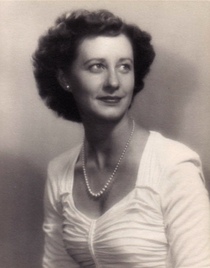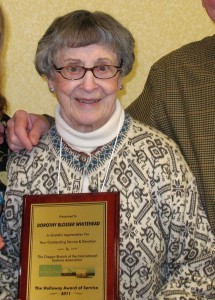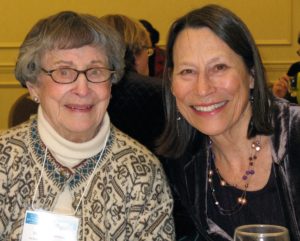Dorothy Blosser Whitehead
August 2, 1921 – January 16, 2015
“A meaningful life is not being rich or popular, but being highly educated, being real and humble. And being able to share ourselves and touch the lives of others.” – Author Unknown
We mourn the loss of a force of nature in the field of literacy and learning—the fearless and formidable Dorothy Whitehead. Born into the Roaring Twenties in Berkeley, CA, her life spanned years of war and peace, not only in world affairs but also in the world of teaching reading, especially to those who struggle with reading.
This rather diminutive, self-effacing lady was a titan in the field of reading, yet her early work was in a very different field. Dorothy earned her B.A. degree from UC-Berkeley in elementary education and psychology, and she became a crack x-ray technician prior to raising her family: daughters Cynthia and Lisa, and son Eric, all of whom survive her.
It was in 1959, several years after her relocation to Oregon, that her friend Dorothy (Dee) Tyack, who had been trained in the Orton-Gillingham multisensory method while at Massachusetts General Hospital, convinced Dorothy that she should tutor a young fourth-grader named Frankie. Despite Dorothy’s protestations that she knew nothing about teaching reading, Dee mentored her step by step, and soon Frankie was reading. It was a revelation, and from that moment on Dorothy was hooked and she never looked back.
Dee Tyack wanted to establish a program in Portland similar to the Mass Gen Hospital Language Clinic where she had been trained. School administrators and the University of Oregon Medical School informed her that such a program was not needed and therefore unavailable in Oregon. Unwilling to accept this response, her own pediatrician put her in touch with Dr. Charles Bradley, a pediatric child psychiatrist who informed her that he knew of many children with learning problems. This led to the establishment of a testing service with private tutor referrals through the pediatric clinic of Dr. Charles Whittemore.
Dorothy began training others while continuing her tutoring, and this cadre of new tutors grew into the “Twelve Loose Women,” so-called because no one wanted to be in charge. From these
beginnings, and with the contacts made by Dee Tyack, Language Skills Therapy was created in 1966 and continues its work to this day. Dorothy badgered Dr. Whittemore so much that he finally relented and gave Language Skills permission to utilize a part of his clinic for their work alongside the testing service, a relationship that endured for many years.
This core group of multisensory tutors always had more work than they could handle, and they realized there was also a need to teach adults how to read. From that point, they created a separate group called Fundamentals of Written Language that performed the same service for adults that Language Skills Therapy was doing for students. Dorothy was also instrumental in forming the Oregon chapter of the Association for Children with Learning Disabilities (ACLD), and she was a member of the Council for Exceptional Children and the International Reading Association.
Dorothy joined the Orton Society, now the International Dyslexia Association, in September 1966. By 1975, together with her tutor colleagues, she helped create the Oregon Branch, sometimes referred to by the acronym ORBIDA. She served on the first board of directors in 1975 during formation, and was elected its first president in 1976. She would serve in that role again in 1992-1993. In all, Dorothy served as a member of the board of directors of the Oregon Branch in all or part of 16 years, in various roles, between 1975 and 1994. The branch honored Dorothy with an award for outstanding service in 1996, and again with the Dale Holloway Service Award in 2011. In 2010 Dorothy’s name was inscribed on a plaque in the Sylvia O. Richardson Hall of Honor at IDA headquarters in Baltimore, MD, paid for through donations from dozens of her friends and admirers.
Dorothy returned to school and earned her teaching credential in 1969, a M.S. in special education in 1970, both from Portland State University. She was an instructor at PSU in the Department of Special Education from 1972-1976. Subsequently she earned her handicapped learners certification in 1979. By then she was teaching full-time for the Beaverton School District at Barnes Elementary School. She trained parent volunteers and other volunteers how to tutor kids in her classroom.
In 1975, as part of a Title III ESEA project for the Oregon State Department of Education, Dorothy authored the Tutor Notebook—A Teacher Incentive Program. That work provided the foundation for publication, in 1991, of the first edition of her tutor manual, Dyslexia: Unlocking the Power of Print, that is still in daily use around the world by many O-G teachers and tutors.
Once the whole language veil descended on public schools, she and her volunteers had to go underground, using the multisensory approach only when a district official was not lurking nearby. At this time the word “dyslexia” was removed from the title so as not to arouse suspicion or upset teachers. When the book was reissued in 1993, “the d-word” again appeared. She knew what worked and what didn’t, and she wasn’t about to be deterred.
Dorothy was generous to a fault with her time, attention, knowledge, and skills—and she was also a very thrifty lady. More than one of ORBIDA’s members has confessed that they first met Dorothy at an IDA conference where she helped pack sleeping rooms 4 to 6 to a room to help shave expenses.
Recognizing an ever-increasing need for qualified tutors, Dorothy created a program within the Oregon Branch of IDA called Multisensory Tutor Training along with Elizabeth Barton, and they started producing Orton-Gillingham trained tutors. Eventually the program moved outside the branch and evolved into the Blosser Center for Dyslexia Resources. This center continues to train tutors today just as Dorothy was trained over 50 years ago. She was a founder and a board member of the Academy of Orton-Gillingham Practitioners and Educators, and a Fellow in the Academy. Her dedication to their high standards for professional certification of tutors and instructors is renowned.
Dorothy’s influence, friendships, mentorships, and impact have touched thousands. Her single-minded, determined approach to spread knowledge and best practices using evidence-based methods is unrivalled in Oregon. Her story was told in the book, The Reading Glitch, authored by Lee Sherman and Betsy Ramsey in 2006.
Dorothy’s respect for and support of neurobiological research was recognized in 1996 when Oregon Health Sciences University named a lobby in her honor. The dedication read, “The lobby of Hearing Research Center, Neuro-Sensory Research Building, Oregon Health Sciences University, named in honor of Dorothy B. Whitehead, multi-sensory educator, dedicated to the understanding of dyslexia and other language processing disabilities.” One of the presenting doctors thanked Dorothy for being the first to point out to him that many reading and spelling problems can originate from hearing difficulties—“auditory processing problems.”
In 2007, her longtime friend and colleague, Ronald Yoshimoto, also an O-G Fellow, established a scholarship in her name within the Oregon Branch of IDA specifically to help defray the cost of attendance at ORBIDA professional development workshops for public school classroom teachers. This scholarship recognizes Dorothy’s long-standing belief that educators in the classroom could benefit—and more critically that their struggling readers could benefit—from multi-sensory teaching methods and strategies.
As those of us fortunate enough to have known Dorothy personally grapple with our loss, we are astounded to reflect on the extent of her influence; we are in awe of her inestimable contributions to education, reading, literacy, and learning; and we are so proud of her accomplishments and thankful for her boundless friendship.
IDA held its 42nd Annual Conference in Portland in 1991, and Dorothy was given the Samuel Torrey Orton Award, its highest honor, in recognition of her contributions to the field. The award summarized Dorothy’s professional life with these words:
“She has salvaged the hopes of countless children;
she has encouraged their parents;
she has educated their teachers;
she has modeled exemplary teaching to their tutors.”
Dorothy indeed shared herself and touched the lives of so many. Her memory will live long in our hearts here in Portland, in Oregon, and around the nation.




